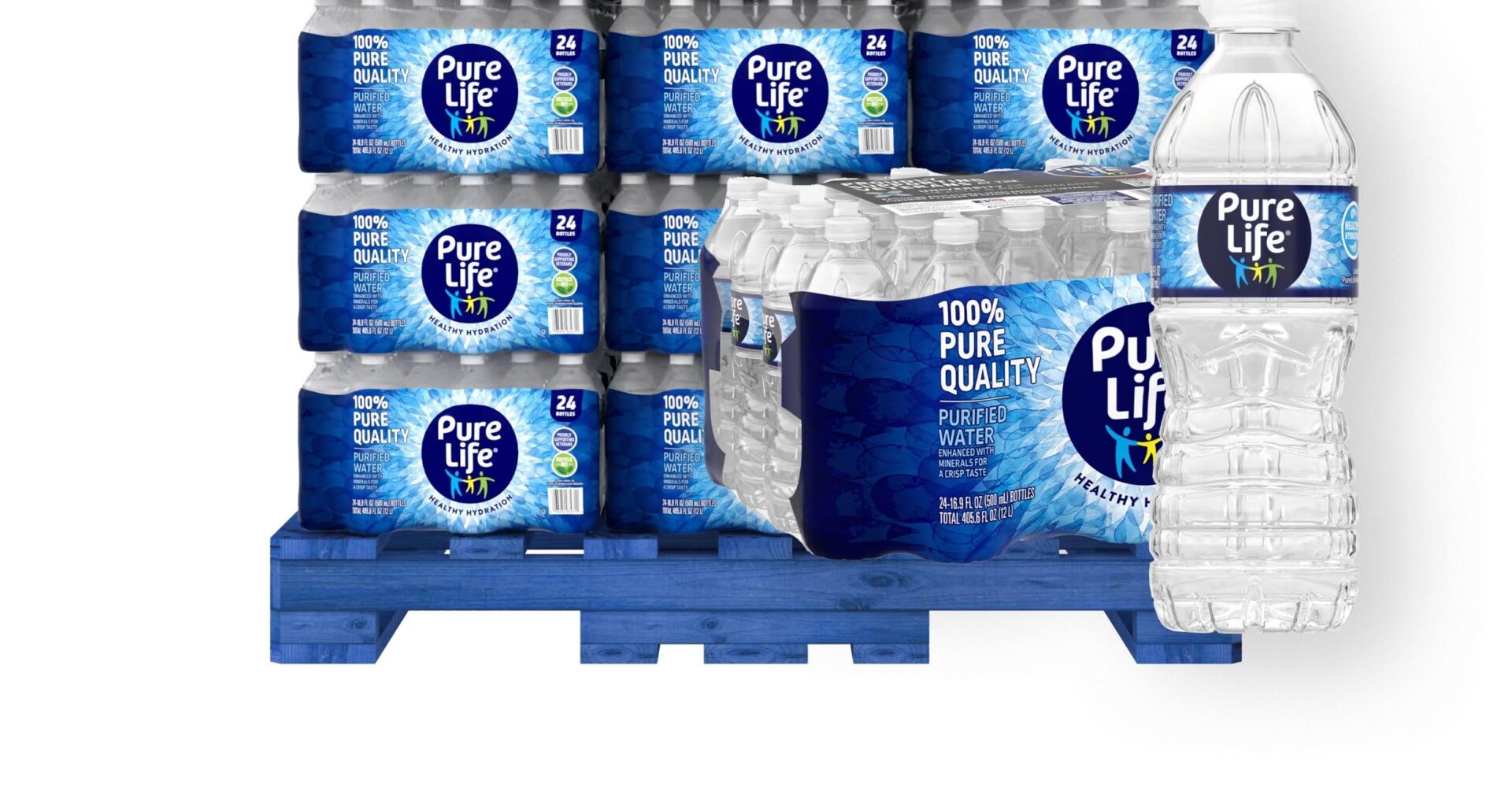Ever find yourself in the grocery store, staring at the sea of bottled water and contemplating just how much a case of those water bottles might weigh? Perhaps you’re planning for a camping trip, a backyard barbecue, or just stocking up for the apocalypse (you never know!). As you hoist that case onto your cart, you may ask yourself: “Just how heavy is this? Can I lift it without pulling a muscle?”
Well, you’re not alone in your curiosity. We’ve all been there, wondering about the weight of the seemingly small but mighty case of water bottles. Whether you’re a fitness enthusiast looking to add some weight to your home workouts or simply a curious mind, this is a question that’s probably crossed your mind.
It’s high time we quench this thirst for knowledge (pun intended)! So, let’s dive into the world of water bottles and get to the bottom of this weighted question.
“Weight is but a number, and yet it holds so much gravity. Especially when it’s the weight of your shopping cart!”
The Surprising Weight of a Case of Water Bottles
Ever found yourself in a grocery store, gazing at a case of water bottles, wondering, “How heavy could this possibly be?” Well, buddy, you’re in for a surprise!
There’s a lot more weight in that seemingly innocent pack of hydration than you might think. Our everyday heroes – delivery drivers, store clerks, and yes, even fitness fanatics who use them for impromptu workouts – might already be in on this heavyweight secret. But for the rest of us, it’s time to spill this wet and wild fact!
The weight of a case of water bottles largely depends on the size and number of bottles it contains. Sounds logical, right? But let’s dive into the specifics.
Doing the Math
Typically, a case contains 24 bottles, each holding a standard volume of 16.9 ounces or half a liter. Now, if you consider that a liter of water weighs approximately 2.2 pounds, we can start doing some quick math.
16.9 ounces is approximately 0.5 liters, so a single bottle weighs about 1.1 pounds. Multiply that by 24, and you get a whopping 26.4 pounds! Yup, you heard it right, a standard case of water bottles weighs as much as a small dog or a hefty Thanksgiving turkey.
The weight can, of course, vary if the case has fewer or more bottles or if the volume of each bottle is different. So, the next time you’re at the store, before you decide to lug two cases of water bottles in each arm, remember, you might very well be lifting your own weight in water!
In the pursuit of hydration, we’re all powerlifters, aren’t we?
Why You Should Know How Heavy a Case of Water Bottles Is
So, you might be asking, “Why on earth would I need to know how heavy a case of water bottles is?” Glad you asked! There are actually a few reasons that might surprise you.
First off, it’s all about convenience. Imagine you’re planning a road trip, a party, or any event that requires hydration. Knowing the weight of a water case can help you plan better, ensuring that you have enough room in your car and enough arm strength to carry it all without strain.
- Convenience is key!
Secondly, this knowledge is essential for emergency planning. In disaster situations, a supply of fresh water is crucial. Knowing how much a case of water weighs will help you determine how much you can realistically store and transport if necessary.
- Be prepared for emergencies!
Lastly, it’s a great way to impress your friends at the next trivia night. Who knew that the weight of a water case could be a conversation starter?
- Trivia night champ, coming through!
So there you have it – not such a random factoid after all, right? Understanding the weight of a case of water isn’t just a piece of obscure knowledge, it can actually make life easier and potentially even save the day. Now, let’s dive into the nitty-gritty of just how much a case of water weighs.
How to Estimate the Weight of a Case of Water Bottles
Ever found yourself staring at a case of water bottles, wondering just how heavy it might be? Well, you’re not alone! We’ve all been there, and sometimes, guessing just doesn’t cut it. So, let’s put an end to the mystery and get down to brass tacks, shall we?
Step 1: Identify the volume. Most bottled water comes in 16.9 fluid ounces (0.5 liters) bottles, and a standard case usually has 24 bottles.
Step 2: Do the math. Water weighs approximately 1.04 kg per liter. So, for a case of 0.5 liter bottles, each bottle weighs about 0.52 kg.
Note: Remember, this weight includes the water and the weight of the bottle itself.
Step 3: Multiply the weight of one bottle by the total number of bottles in the case. In our scenario, 0.52 kg x 24 (bottles) equals approximately 12.48 kg. Voila! There you have it!
But what about cases with different bottle sizes, you ask? Fear not, my friends! The same principle applies. Just adjust the volume in step 1 and proceed as usual.
So, next time you’re eyeing a case of water bottles, don’t be puzzled. Just do the math and lift with confidence!
Factors That Affect the Weight of a Case of Water Bottles
Let’s take a deep dive into the ocean of factors that can turn your lightweight case of water bottles into a mini workout! It’s not as simple as H2O, my friend. There’s more to it – and we’re about to uncover all the wet secrets.
Volume of the Bottle
Firstly, the amount of liquid each bottle can hold plays a significant role. A case of tiny 8-ounce bottles won’t weigh nearly as much as their 16-ounce counterparts. It’s a bit like choosing between a feather and a stone of the same size—deceptively similar, yet dramatically different.
Number of Bottles
How many bottles are in a case? This is a biggie! A case of 24 bottles inevitably weighs more than a case of 12. It’s like the difference between a litter of kittens and a full-grown clowder of cats. One you can lift with ease, the other might leave you huffing and puffing!
Material of the Bottle
The material of the bottle itself can also tip the scales. While a case of plastic bottles might be a breeze to carry, those made of glass could give your muscles a good workout. Imagine it as a pillow fight versus a snowball fight – the latter definitely packs more of a punch!
Case Material
Last but not least, the case material. Is it a heavy-duty cardboard or a lightweight, easy-to-carry plastic? Think of it as the difference between carrying a suitcase filled with rocks or feathers. The content might be the same, but the container can change everything!
So, the next time you pick up a case of water bottles, remember it’s not just about the water. It’s a symphony of factors, all playing their part in the grand orchestra of weight. Stay hydrated, but more importantly, stay curious!
The Difference Between a 12-Pack and a 24-Pack of Water Bottles
Ever find yourself staring down the beverage aisle, trapped in a quandary between a 12-pack and a 24-pack of water bottles? Well, you’re not alone. Water weight, it turns out, is a pretty important consideration when you’re lugging around hydration for the whole family.
The 12-Pack: Let’s start small. A typical 12-pack of 16.9 oz. water bottles weighs about 15 pounds. That’s roughly equivalent to a medium-sized bowling ball or a hefty Thanksgiving turkey. You could squat, curl, or press this baby for a light workout, no gym membership required!
The 24-Pack: On to the big leagues. A regular 24-pack of 16.9 oz. water bottles tips the scale at roughly 30 pounds. That’s akin to a medium-sized dog, a hefty stack of college textbooks, or a small toddler. Hauling this one around could definitely substitute a trip to the gym. Who knew hydration could be such a workout?
So, there you have it. Whether you’re on hydration duty for the little league team or planning a weekend camping trip, knowing the weight of your water is crucial. Remember, stay hydrated and keep lifting!
How to Carry a Case of Water Bottles Without Straining Your Back
Ever tried to lift a hefty case of water bottles? If you’re not careful, you could end up pulling a muscle or even worse, injuring your back. It’s not just about brute strength, but rather about technique.
Now, you might be wondering, “How heavy is a case of water bottles, anyway?“. A typical case of bottled water contains 24 bottles, with each bottle holding 16.9 ounces. Do a little math, and you’ll find you’re lugging around a hefty 30 pounds or so. Yes, that’s comparable to a toddler!
So, how can you carry this liquid toddler without straining your back? Here’s a helpful step-by-step guide:
- Prepare for the lift: Stand close to the case, feet hip-width apart. This stance helps distribute the weight evenly.
- Bend at the knees: This is crucial. Avoid bending your waist as this puts undue stress on your back.
- Grip the case: Make sure you have a solid hold. You don’t want to drop it halfway to the fridge!
- Lift gradually: Using your leg muscles, not your back, lift the case. Keep your body straight and avoid twisting.
- Carry with care: Keep the case close to your body. This reduces the strain on your back.
There you have it! Hauling a case of water bottles doesn’t have to be a Herculean task. With these tips, you can avoid injury and ensure those thirst-quenchers get to their destination safely. Remember, it’s all in the technique!
The Environmental Impact of a Case of Water Bottles
Ever wonder about the ecological footprint of that heavy case of water bottles you’ve got stashed in your pantry? Let’s dive in and uncover some not-so-fun facts about our plastic companions.
First things first, the production of these bottles uses a considerable amount of energy. Manufacturing a year’s worth of bottled water can consume enough energy to power around 1.3 million homes for a year! That’s a pretty hefty carbon footprint.
Did you know? An estimated 17 million barrels of oil are used in the annual production of water bottles in the US alone.
Next up is transportation. The journey of a water bottle from the factory to your local supermarket racks up some serious miles, further contributing to greenhouse gas emissions.
Then there’s the issue of waste. Despite recycling efforts, only about 30% of plastic water bottles end up in recycling bins. The rest? They’re off on a 450-year decomposing adventure in landfills, or worse, in the oceans, posing a threat to marine life.
| Environmental Impact | Details |
|---|---|
| Energy Consumption | Equivalent to powering 1.3 million homes for a year |
| Transportation | Contributes to greenhouse gas emissions |
| Waste | Only 30% of bottles are recycled; rest end up in landfills or oceans |
So, the next time you hoist that case of water bottles into your cart, consider the weight it carries beyond the physical. It’s a hefty environmental load we’re all lugging around. Fortunately, there are alternatives – reusable water bottles, anyone?
Alternatives to Buying a Case of Water Bottles
Ever thought about how many alternatives there are to lugging around a hefty case of water bottles? Well, you’re in for a treat because we’re about to dive right in. Let’s explore some fun and efficient alternatives that are not only easy on your back but also kind to the environment.
Go Reusable
Reusable Water Bottles: They’re a winner all around. You cut down on plastic waste and save money in the long run. Plus, with so many designs and sizes available, there’s a perfect fit for everyone.
Upgrade Your Tap
Water Filters: If you’re skeptical about the taste or quality of your tap water, consider installing a water filter. They’re easy to use, and you’ll always have fresh water at your fingertips.
Stay Hydrated, Stay Healthy
Infused Water: Who said water has to be boring? Add a zing to your hydration routine by infusing your water with fruits, herbs, or even a dash of cucumber. Not only does it taste great, but it also adds a splash of nutrients!
Let’s Get Techy
Smart Water Bottles: These high-tech bottles remind you to drink water throughout the day and even track your intake. It’s like having a hydration coach right by your side!
To wrap up, while a case of water bottles might seem like the most convenient choice, these alternatives prove that convenience doesn’t have to weigh you down. So next time, instead of reaching for that heavy case, why not give one of these a try? You might just find your new favorite way to stay hydrated!
The Cost Savings of Buying a Reusable Water Bottle
Hey, let’s talk about your wallet for a second. No, I’m not asking for a loan, just a moment of your time to chat about the cost savings of a reusable water bottle compared to buying a case of water bottles. It’s like comparing apples to oranges, or better yet, dollars to cents!
Firstly, think about this. A case of water bottles, let’s say around 24 bottles, will set you back anywhere from $5 to $10 depending on the brand. Now add that up if you’re buying one every week. That’s a whopping $520 in a year on the higher end!
Now, compare that to a good quality reusable water bottle. These generally cost between $10 to $30. So, even if we consider the highest price, guess what? You’ve still saved an impressive $490 in a year!
But wait, there’s more!
Have you ever thought about how heavy a case of water bottles is? You’re lugging around approximately 30 pounds every time you stock up. Now, that’s an unintended workout right there! A reusable water bottle, on the other hand, is light as a feather in comparison.
The Environmental Impact
Here’s something else to consider. By choosing a reusable water bottle, not only are you saving money, but you’re also contributing to the well-being of our lovely planet. Less plastic waste, less energy wasted on production and transportation of those disposable bottles, and more high fives from Mother Nature.
So, next time you’re standing in the grocery aisle contemplating a case of water bottles, remember: a reusable water bottle is lighter, cheaper, and Mother Nature-approved. Now that’s a win-win-win, my friend!
How to Stay Hydrated Without a Case of Water Bottles
How’s this for a conundrum? You’re keen to stay hydrated, but also dreading to heave around a weighty case of water bottles. Not to worry, there are ways to strike a balance. Let’s dive into the bubbly world of hydration, minus the bulkiness of water bottles.
Tap into the Magic of Tap Water
Ever considered the humble tap? That’s right, your kitchen faucet is a treasure trove of hydration. Fill up a reusable water bottle and voila! You’re all set. Plus, think of all the dollars you’re saving and the environment you’re helping.
Bring in the Infusers
Want to add a little zest to your H2O? Use a water infuser with your favorite fruits and herbs. It’s a fun and healthy way to jazz up your water, and it’s definitely lighter than lugging around cases of flavored water bottles.
Hydrate Smart with Foods
Believe it or not, water isn’t the only route to hydration heaven. Foods such as cucumbers, watermelons, and strawberries are packed with water. The bonus? You get a tasty snack while keeping your hydration levels up!
Embrace the Hydration Apps
Technology comes to the rescue once again! There are numerous hydration apps that remind you to drink water throughout the day. No need for a case of water bottles, just a smartphone and a reusable bottle.
So, fellow hydration seekers, unburden yourselves from the weight of water cases. Your route to staying hydrated can be as light, refreshing, and environmentally friendly as you want it to be. Cheers to that!
The Convenience of Having a Case of Water Bottles on Hand
Picture this: It’s a scorching summer day, and you’ve just come in from a punishing run. You’re as thirsty as a camel fresh off a desert trek. But wait, you’re in luck! You’ve got a case of water bottles stashed away just for moments like these.
Having a case of water bottles on hand is like having your personal fountain of hydration. It’s a lifesaver on days when the heat is unbearable, or when you’re hosting a backyard BBQ party. It’s also a godsend for those unexpected power outages when your refrigerator gives up the ghost.
Now, you might be asking, how much does a case of water bottles weigh? Well, my friend, let’s dive into that.
The Weight of a Case of Water Bottles
Before we start, it’s important to note that the weight of a case of water bottles can vary. It depends on two main factors: the number of bottles and the volume of each bottle. On average, a case of water bottles weighs about 24 to 50 pounds.
- 24-Pack of 500ml Bottles: This popular choice weighs around 26.5 pounds. That’s the weight of a chubby pug!
- 12-Pack of 1 Liter Bottles: This option weighs approximately 28 pounds. As heavy as an adult dachshund.
- 24-Pack of 1 Liter Bottles: This one is the heavyweight champ, tipping the scales at almost 50 pounds. That’s about as heavy as a small bale of hay!
Keep in mind, carrying a case of water bottles can be a mini workout. Think of it as a bonus for your biceps and back muscles!
Pro Tip: If you find lifting a case of water bottles a daunting task, consider using a hand truck or a cart. Your muscles (and your chiropractor) will thank you!
So, whether you’re planning for a party, a picnic, or a fitness session, a case of water bottles is always a smart move. Just remember to lift with your legs, not your back, and stay hydrated, my friend!






